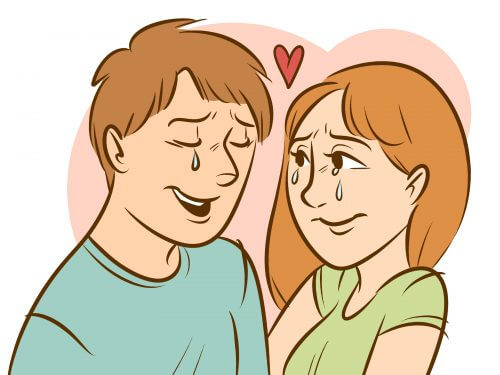Love and Your Brain: How Does the Brain Respond When You’re In Love?

Although it is often said that the heart is involved when you find your “better half,” the brain is what’s responsible for making you feel those “butterflies” in your stomach and other feelings related to love. In today’s article, we want to take a look at the reaction between love and your brain and tell you how your mind responds when you fall in love.
Love and Your Brain

Love is that beautiful feeling of being “in the clouds” and that need to be close to a special person. However, not all of the emotions linked to falling in love are “romantic.” Actually, many of them come from the brain.
Because your mind produces different chemical substances (neurotransmitters and hormones), it keeps you in that constant state of “enchantment.”
Of course, it’s much more poetic to talk about hearts and butterflies. However, science is now responsible for analyzing love – a task that was previous left to poets, musicians, and authors.
Science has discovered many interesting things about love and your brain:
- The changes occur in your nervous system. It’s not magical – it’s biological.
- When you fall in love, you can’t talk normally, you sweat bullets, your heart races, and you blush.
- All that is caused by chemical changes inside you.
There’s more: during the initial stage of falling in love, you give off pheromones and other olfactory signals that the other person will notce.
Once this has happened, the next step is an increase in the production of two hormones: adrenaline and noradrenaline.
- Both contribute to making you feel attraction, and also a bit silly.
- The first one raises your blood pressure and speeds up your pulse.
- The second is responsible for sexual attraction and feelings of well-being whenever you’re close to the one you love.
During this stage, another hormone also gets involved: testosterone. Although it is more commonly associated with men, women also experience it (to a lesser extent).
It’s a type of aphrodisiac that’s generated when you feel sexual desire.
Do you want to know more? See: 5 Remedies to Regulate Hormones Naturally
True love, hormones, and the brain

After those first moments of euphoria and passion, true love appears. With it, more hormones are produced in your brain.
One of them is phenylethylamine, or PEA.
This natural amphetamine is stimulating. At the same time, it leads you to be excited so that you don’t want to think about anything other than the person you love. You want to take care of them, you want to pamper them, and you want to be with them all the time.
This hormone can alter your perception and cause you to believe your partner is perfect and has no flaws.
It’s also responsible for triggering other neurotransmitters in your brain. For example, dopamine is responsible for pleasure and reinforcement.
That’s why it’s so often said that love is like a drug, and we’re addicted to being in love.
If for some reason your relationship ends at this stage, you’ll go through the symptoms of withdrawal similar to those of a person who takes some kind of drug (cigarettes or alcohol).
Another substance also appears on the scene: oxytocin. This makes you more cuddly, affectionate, and willing to express your feelings through kisses and touch. With good reason, this is called “the love hormone,” and it’s related to reproduction, childbirth, and breastfeeding.
It occurs in the hypothalamus and is stored in the pituitary gland (which secretes it when necessary). When it works as a neurotransmitter, it’s stimulating and increases sexual arousal.
When oxytocin is stored in large quantities, you’ll feel a greater desire to be with your loved one.
It triggers a pleasurable response in the brain and acts as a “reward.” This allows you to even see your partner as more attractive.
Does the brain fall in love forever?

Unfortunately, the brain can’t secrete “love” hormones all the time. Actually, you wouldn’t be able to bear it! The chemical reactions related to falling in love can continue to appear for up to five years in a relationship.
After that time, your body and mind grow accustomed to the “drug.”Then, it no longer has the same effect as it did before (just as with certain medications).
Over the years, you’ve gotten to know your partner better and brought them down off their pedestal. Then, you go through different positive and negative experiences.
This is when you’ll have to work harder at your relationship, because your brain no longer does it for you.
Unfortunately, monotony and boredom arise when you have less oxytocin and phenylethylamine in your body.
Nevertheless, there is yet another hormone that gets involved: vasopressin, which is related to monogamy and bonding.
The passion in the beginning may have disappeared, but now you see the truth about the other person: what is beautiful and enduring.
It might not be the most passionate time for you. However, it’s the most beautiful because you experience respect, trust, and harmony with your partner.
From now on, your brain doesn’t produce hormones like it used to. However, it allows you to understand each other and come up with the best solutions for your relationship, now and forever.
This text is provided for informational purposes only and does not replace consultation with a professional. If in doubt, consult your specialist.








